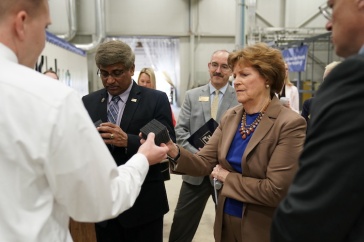
In UNH’s driving simulator, a researcher wears Microsoft HoloLens augmented reality glasses, which overlay virtual objects on the “world” shown by the simulator. Courtesy of Andrew Kun.
As our cars become more automated, could we turn our commutes into productive — and safe — office hours? That’s the question UNH researcher Andrew Kun and colleagues from four other institutions will explore with a $2 million grant from the National Science Foundation.
“Millions of people spend nearly an hour of each working day driving to and from work. With automated vehicles, part of this time could be used toward work-related efforts,” says Kun, associate professor of electrical and computer engineering. “With this project, we want to understand how realistic current and future technologies might help us work in automated vehicles and increase the productivity and well-being of workers, as well as the productivity and profitability of firms.”
UNH will lead the four-year project, collaborating with Harvard University, Wellesley College and the universities of Washington and Wisconsin.
“Automated vehicles hold out the promise of significantly improving the safety of driving. They also open up possibilities for using our time in vehicles to rest, to play and to work, because we will not constantly need to focus on the road — the car will do this for us.”
To understand how technology can allow commuters to safely combine activities related to work with those related to driving, researchers will develop and test a new multi-interface in-vehicle environment in driving simulators and real vehicles. The project will integrate three types of user interfaces — voice, augmented reality and tangible interfaces — and will generate design guidelines for researchers, practitioners and policy makers.
“Automated vehicles hold out the promise of significantly improving the safety of driving. They also open up possibilities for using our time in vehicles to rest, to play and to work, because we will not constantly need to focus on the road — the car will do this for us,” Kun says. “The question we are asking is this: How do we design the inside of the car to allow us to take advantage of this new-found freedom from driving?” At UNH, this funding will support a doctoral student and several undergraduate student researchers.
The grant falls under the NSF’s Future of Work at the Human-Technology Frontier (FW-HTF) initiative, one of the agency’s 10 new Big Ideas for Future Investment. The FW-HTF cross-directorate program aims to respond to the challenges and opportunities of the changing landscape of jobs and work by supporting convergent research.
-
Written By:
Beth Potier | UNH Marketing | beth.potier@unh.edu | 2-1566



















































